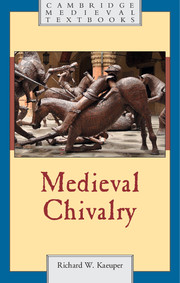Book contents
- Frontmatter
- Dedication
- Contents
- List of figures
- Acknowledgments
- Part I An approach to chivalry: was it real and practical?
- Part II Three broad chronological phases
- Part III The privileged practice of violence
- Part IV Chivalry, governing institutions, and ideals
- Part V The world of chivalric emotions
- Reflections
- Select Bibliography
- Index
Part V - The world of chivalric emotions
Published online by Cambridge University Press: 05 August 2016
- Frontmatter
- Dedication
- Contents
- List of figures
- Acknowledgments
- Part I An approach to chivalry: was it real and practical?
- Part II Three broad chronological phases
- Part III The privileged practice of violence
- Part IV Chivalry, governing institutions, and ideals
- Part V The world of chivalric emotions
- Reflections
- Select Bibliography
- Index
Summary
Modern cinematic audiences must feel they understand knightly emotions. The righteous wrath of knights fills screens with a swirl of bodies, blades, and blood. In fact, “getting medieval” on someone has come, in common parlance, to suggest unrestrained violence fueled by equally unrestrained emotions. Yet from another angle and with little sense of contradiction, the imagined chivalrous show deliciously amorous sensitivity; with hearts thumping in ample chests, they speak soft, poetic lines about intense feelings of love, or perhaps even sing them with lute accompaniment, to demure ladies on balconies. Although usually strong, silent types, when standing tall amidst a courtly audience the knights express finely felt pride in birth and accomplishment, or project outrage at any imputed dishonor, employing elaborate speech, with dramatic gestures to match.
Such popular views can claim at least some historical merit, catching a panoply of intense emotions that infused chivalric thought and actions. Distinct traces of such feelings and consequent actions appear throughout a wide range of sources, from narratives within chronicles to vividly dramatic scenes in imaginative literature. All this evidence presents displays of intense emotions that accompanied important occasions and conveyed or enhanced their meanings.
Yet popular books and films assume that our medieval forebears were in essential ways and at all times and social levels just like us. Is this not how they appear in popular media? Their costumes may be more dashing and colorful, their speech charmingly quaint, but their emotions appear simply cut along lines of an eternal pattern. From such an ahistorical viewpoint, any questions about medieval emotions simply self-destruct. Why should emotions among the chivalric elite require any special focus when we can look within ourselves and understand all?
In fact, medieval evidence contradicts this common line of thought. Even if some broad affective human traits appear in every era, the relative importance of particular emotions and their embodiment in social roles and relationships have surely varied. A modern emotional template cannot be force fit upon medieval society in general or on the knights in particular. Contrary to the modern commitment to casualness and informality (coupled with at least theoretical egalitarianism), medieval emotions proudly operated in formal and heroic mode and in the service of social, political, and religious hierarchy. Speech best conveyed meaning and secured assent when delivered in the high style; actions that were formally dignified and dramatically presented best secured results.
- Type
- Chapter
- Information
- Medieval Chivalry , pp. 311 - 320Publisher: Cambridge University PressPrint publication year: 2016

